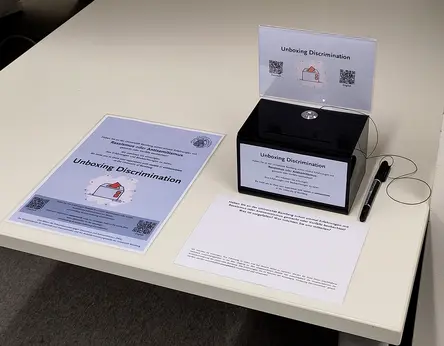Unboxing Discrimination

How does the campaign work?
The boxes for the campaign were available in the entrance areas of all libraries as well as the International Office from 14 January 2025 until 01 June 2025.
If you had encountered racism or antisemitism at the University of Bamberg, you were able to write your experiences or observations on the available slips of paper and put them in the boxes.
Beyond the campaign, we want like to encourage you to report cases of racism and antisemitism and to seek counselling.
Further Information
By conducting the campaign “Unboxing Discrimination,” the University of Bamberg wants to address forms of racial and antisemitic discrimination, especially relating to incidents that have not been officially recorded.
The initiative makes no claims of being a representative survey. Rather, we want to provide the space for sharing experiences that would otherwise remain unknown. Identifying discrimination is a crucial step toward combating discrimination and raising awareness throughout our university.
As part of “Unboxing Discrimination,” we are first focusing on racism and antisemitism. Nevertheless, we want to stress that the University of Bamberg opposes all forms of discrimination. We encourage you to share experiences of discrimination even beyond the scope of this campaign and to seek out counseling. We have linked an overview of counseling services further down on this page.
The university’s directive “Respecting Boundaries(153.4 KB, 5 pages)” defines discrimination as “demeaning a person’s dignity and restricting their rights and freedoms. Discrimination entails any unjustified less favorable treatment of a person on the grounds of a factor that they themselves cannot control.”
The term discrimination describes treatment that disadvantages a person based on a protected characteristic such as gender, age, ethnic origin, disability, sexual orientation, or religion.
Discrimination is always subjective, whether intentional or not. The impact on the affected person is crucial, not the motive.
Racism is the practice of devaluating people due to their appearance, their name, and their (assumed) culture, origin, or religion. Racism means judging and devaluing people because they supposedly belong to some homogeneous group instead of forming an opinion based on their individual merits, abilities, and qualities (cf. the Amadeu Antonio Foundation).
In our societal realities, racism can take on many different forms, which is why we also speak of racisms in the plural. Anti-Black racism, anti-Muslim racism, anti-Slavic racism, anti-Asian racism, and racism against Roma and Sinti are examples of specific forms of racism (cf. the 2023 report of the National Monitoring of Discrimination and Racism(3.2 MB)).
The International Holocaust Remembrance Alliance (IHRA) defines antisemitism as “a certain perception of Jews, which may be expressed as hatred toward Jews. Rhetorical and physical manifestations of antisemitism are directed toward Jewish or non-Jewish individuals and/or their property, toward Jewish community institutions and religious facilities" (2016).
If you want to talk about discrimination you have experienced and would like some counseling, please contact the university’s Anti-Discrimination Office. All inquiries are treated with strict confidentiality.
You can find an overview of further counseling and advisory services available at the university here.
Do you have questions about the campaign “Unboxing Discrimination”? Are you interested in additional information on the university’s efforts to prevent racism and antisemitism? Do you want to get involved? If so, please contact the team of Preventing Racism and Antisemitism (PRA) at pra(at)uni-bamberg.de.
Additionally, feel free to get in touch with the Vice-President for Diversity and International Affairs, Prof. Dr. Sabine Vogt (vp.div-int(at)uni-bamberg.de) and the contact person at the Anti-Discrimination Office, Dr. Cindy Strömel-Scheder (antidiskriminierung(at)uni-bamberg.de) if you have further questions.
